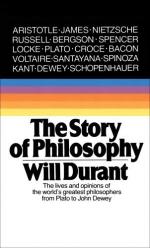
|
| Name: _________________________ | Period: ___________________ |
This test consists of 15 multiple choice questions and 5 short answer questions.
Multiple Choice Questions
1. To what end does Socrates develop his Socratic Method?
(a) to open a private university
(b) to perfom biological experiments
(c) to test the assumptions of his pupils
(d) to impress the multitudes
2. What comprises Plato's writing style?
(a) mathematics, rhetoric, and music
(b) philosophy, rhetoric, and mathematics
(c) drama, science, and sophistry
(d) philosophy and poetry, science and art
3. What does Aristotle teach at the Lyceum?
(a) physical and mental training
(b) athletics and mathematics
(c) biology and natural sciences
(d) the socratic Method
4. What does Plato say is a science and art one must live and prepare for?
(a) military leadership
(b) oratory
(c) statesmanship
(d) teaching the young
5. How far is Alexander able to spread Greek culture?
(a) into Egypt
(b) into Persia
(c) all over the world
(d) into Asia Minor
6. At his birth in 384 B.C., into what kind of family is Aristotle born?
(a) a family of travelers
(b) a medical family
(c) a family of philosophers
(d) a military family
7. How does Voltaire think what is wrong with most recorded history could be corrected?
(a) only philosophers should write history
(b) history should be forgotten
(c) only scholars should write history
(d) history should only be written by scientists
8. What does Bacon call for elimination in his philosophy?
(a) the model of the philosopher king
(b) a private banking system
(c) public education
(d) several errors he calls idols
9. What is one result of Aristotle's prolific output of writing?
(a) a large amount of errors
(b) an error free reference library
(c) a need to build larger libraries
(d) a definitive answer to all philosophical questions
10. What is Voltaire's literary output?
(a) hundreds of manuscripts
(b) ninety-nine volumes
(c) three plays, four novels, and 100 essays
(d) fifty-four volumes of work
11. Where is a meeting held to discuss the Republic?
(a) in the Parthenon
(b) at the Acropolis
(c) at the Lyceum
(d) at the house of a wealthy aristocrat, Cephalus
12. Where does Voltaire write The Romances?
(a) in Frankfurt, Germany
(b) in London, England
(c) in Cirey, France
(d) in Bonn, Germany
13. What does Aristotle define as the entire vital principle of any being?
(a) soul
(b) motion
(c) energy
(d) matter
14. How is Plato's early life best described?
(a) a playboy and a religious fanatic
(b) an idle life and a failure as a soldier
(c) a comfortable athletic youth and a successful soldier
(d) a life of poverty and destitution
15. In what work does Voltaire discuss the morals and spirit of the nations from Charlemagne to Louis XIII?
(a) The Short Novels
(b) The Essay on Morals
(c) The Romances
(d) The History of Morals
Short Answer Questions
1. What happened after Spinoza dispensed with faith?
2. What is Spinoza's second book?
3. To answer Rousseau, what satirical story does Voltaire write about the best of all possible worlds?
4. What does not affect France like it does Germany and England?
5. What does the King of Syracuse learn that causes him to cancel his invitation to Plato to organize Utopia?
|
This section contains 513 words (approx. 2 pages at 300 words per page) |

|




